Always the most wonderful of festivals, Cambridge Folk Festival is something we at 1st 3 Magazine genuinely look forward to every year.
Staying true to its roots and not too big for its boots, CFF continues to offer a profusion of surprises each and every year. 2024 was no exception, featuring a clutch of new and exciting artists from traditional folk to crossover genres, with a legend or two thrown in for good measure.
“With this, we acknowledge the talented souls who have passed through our lives and were taken far too soon: Manuela Henrike Klock-Glazebrook and Svenja Block. With every twang of a Gretsch and every click of a camera shutter, we will remember you.”
Cambridge provides a sense of stability in this unstable world'
With a line-up featuring everyone from Peggy Seeger to Flamy Grant, it was tricky to know where to start. Why not start with a veritable rock god?
Friday evening backstage at the Cambridge Folk Festival 2024, Robert Plant sauntered in under the Cherry Hinton sunshine. Seemingly gentle and unassuming, he flicked his trademark locks, broke into a half-smile, and let out a soft and mellow “hi.” This man, the iconic frontman of Led Zeppelin, stands as one of rock’s most enduring and charismatic figures.
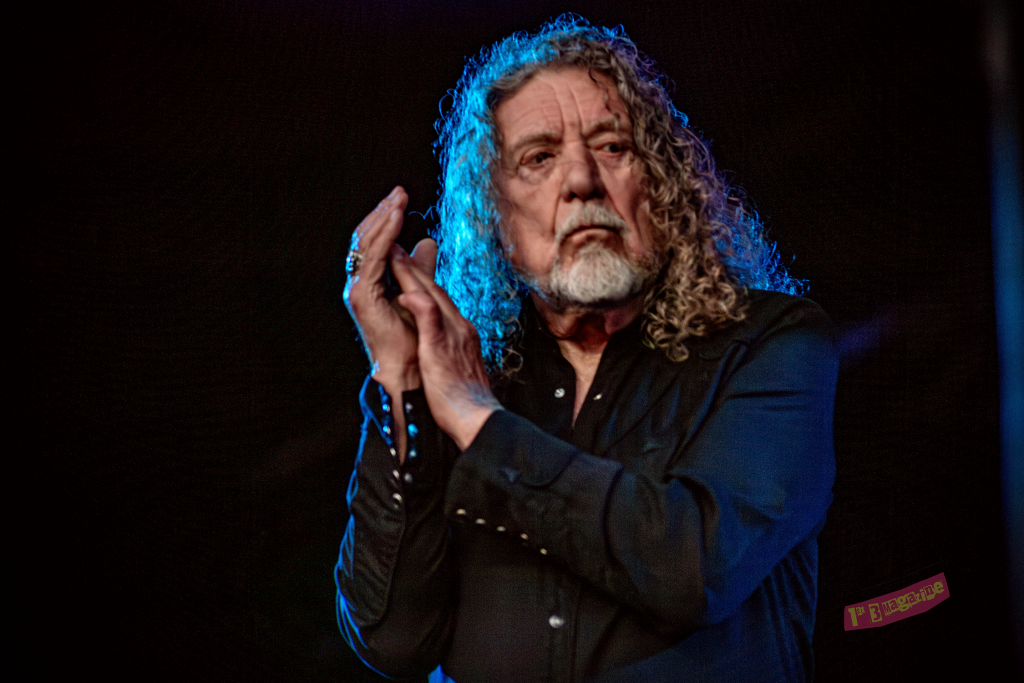
Plant’s contributions to Zeppelin’s ground-breaking fusion of blues, rock, and folk laid the foundation for heavy metal, while his lyrical forays into mysticism and mythology expanded the genre’s narrative horizons. So why is he at the Cambridge Folk Festival?
Post-Zeppelin, Plant has fearlessly reinvented himself, exploring a kaleidoscope of sounds from North African rhythms to Americana, always with an unwavering commitment to artistic evolution. His career, marked by restless curiosity and a refusal to be pigeonholed, epitomizes the spirit of rock ‘n’ roll innovation.
Today, Plant is here with his new project, Saving Grace, featuring Suzi Dian on vocals. Although now a more mature man, on stage, his voice still wails like a banshee and soars with the ethereal grace of a mythic bard. This vocal prowess and magnetic presence have firmly etched his name into the annals of music history.
Although not yet reaching god-like status, another heavy hitter of the weekend was the sibling duo Larkin Poe. On our radar for a while now, they secured the coveted Saturday night headline slot. They bounced around the stage with their down-‘n’-dirty Southern bluesy rootsy rock and roll, igniting both the aging Zeppelin devotees and the younger rock and folk fans alike, despite minor technical issues
An unexpected highlight of the weekend was the Banjoy Goddesses. While some festival-goers didn’t bother heading over to Stage 2 on Saturday, not having heard the name before and finding no search results on Google, those who took the chance or heard the rumors were treated to a rare performance by a trio of, as the name suggests, goddesses of the twangy stringed instrument.
All performing separately at the festival, as described below, seasoned festival performer Leyla McCalla, up-and-coming Brooklyn youngster Nora Brown, and the folk legend Peggy Seeger joined forces to showcase the diversity, versatility, and beauty of the banjo.
Interspersed with chat led by Peggy, discussions of how their banjos were tuned (there are many different tunings that can be used, as the banjo experts among you will know), and a selection of banjo jokes (e.g., ‘What’s the difference between a banjo and an onion? Nobody cries when you cut up a banjo.’ or ‘What’s the difference between a banjo and a harmonica? A harmonica only sucks every other note’), they formed a formidable trio of female folk talent spanning generations, with Peggy clearly encouraging the other two.
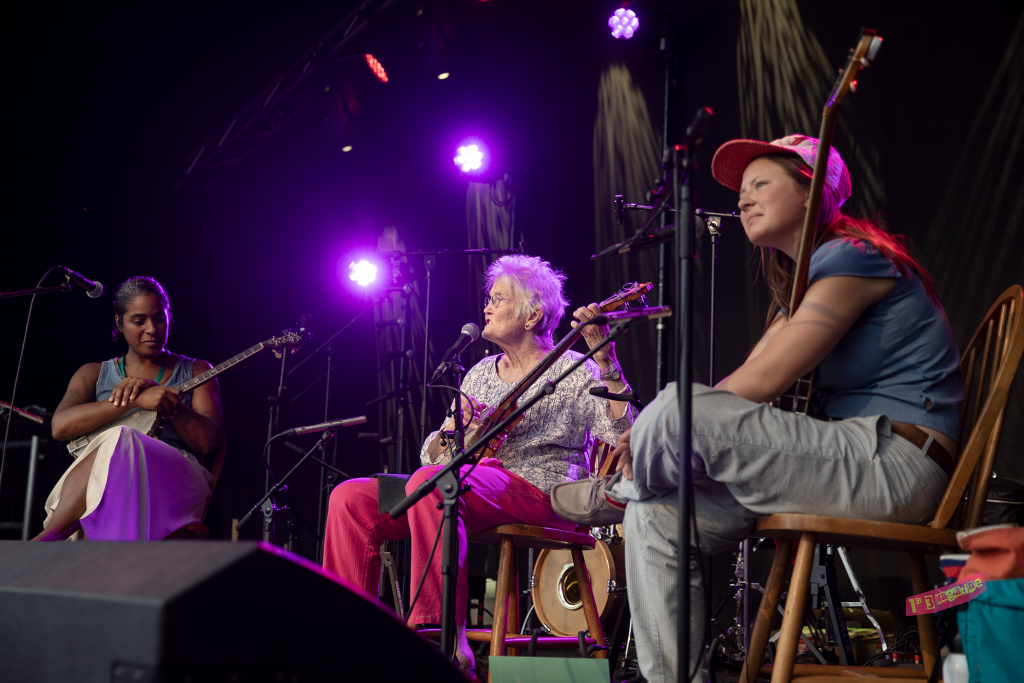
From Leyla’s touching rendition of a Creole heartbreaker song played on the four-string, to Nora’s gentle picking of a Louisiana number on the five-string, and, of course, Peggy’s effortless virtuosity, this truly was a set to remember for years to come.
Nora had played Stage 2 the previous day with Stephanie Coleman. Clearly in tune with each other, they finished each other’s sentences, chatted about their travels, and played like two old-timers who had been sitting on the porch together for years, chewing the cud.
Their New York accents and baseball caps belied their swampy Southern brand of folk. With Nora’s proficiency on guitar and banjo, and Stephanie’s talent on the violin, this pair are surely rising stars of the scene.
Fellow Banjoy Goddess Leyla McCalla played the main stage on Saturday. Alternating between banjo, guitar, and cello, her Haitian heritage was evident in both the infectious Caribbean lilt of her music and her emancipatory politics. As she pointed out, it was the only country founded on the abolition of slavery (read The Black Jacobins by C.L.R. James if you don’t know your history), and she read a poem written on the eve of the revolution that translated as, ‘Listen to the voice of liberty that sings in your heart.’
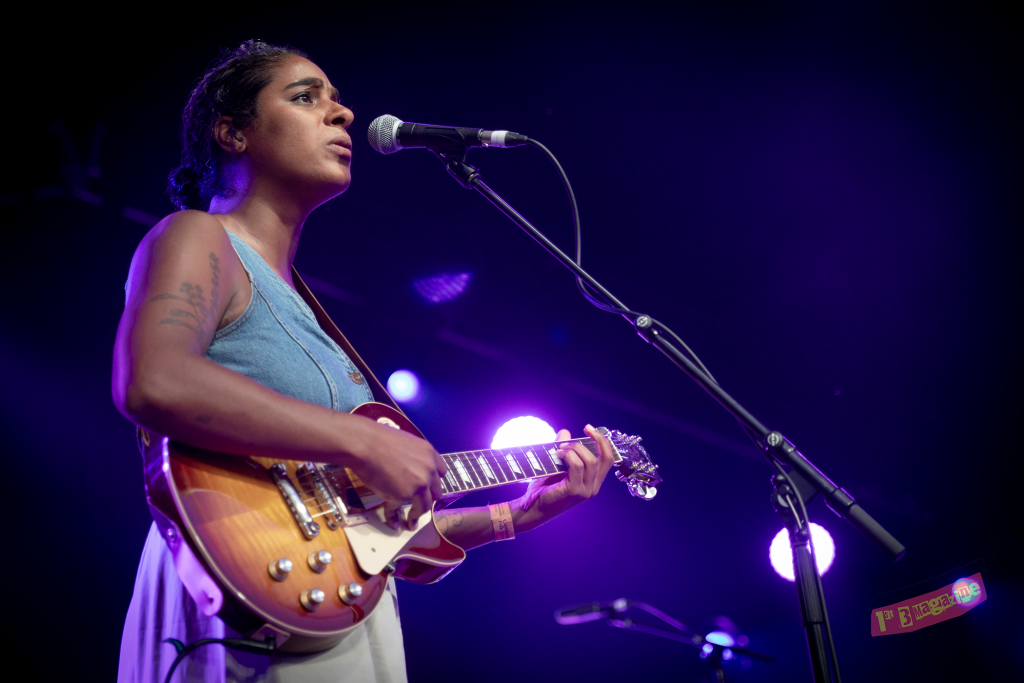
Her new album, Sun Without the Heat, is influenced by the work of Black feminist Afrofuturist writers, with the metaphor that expecting the sun without the heat is like expecting equality without a commitment to activism and transformative justice. She emphasized how we need to practice peace rather than just believe in it. She commended those in the audience with Palestinian scarves and flags and reminded everyone that the fight against neo-colonialism is ongoing.
General legend and the grandmother of progressive folk, Peggy Seeger, now in her late 80s, stands as an enduring inspiration that wisdom, vitality, and sharp wit can coexist. A towering figure in the folk music community, Seeger’s influence spans decades, during which she has tirelessly championed social justice, equality, and the power of music to affect change.
With her sons in the support band, she brought tears to the eyes of many with her renditions of ‘How I Long for Peace’ and ‘I’m Gonna Be an Engineer,’ sung with pride, sorrow, and hope by a member of the generation that did so much to advance civil rights and women’s liberation. Her voice, though softened by time, still carries the weight of her convictions, her lyrics a testament to a life dedicated to activism and artistry. As she strummed her guitar, one could sense the deep reservoir of experience and commitment behind each note—a reminder of the ongoing relevance of her work and the vital role music plays in the fight for a better world.
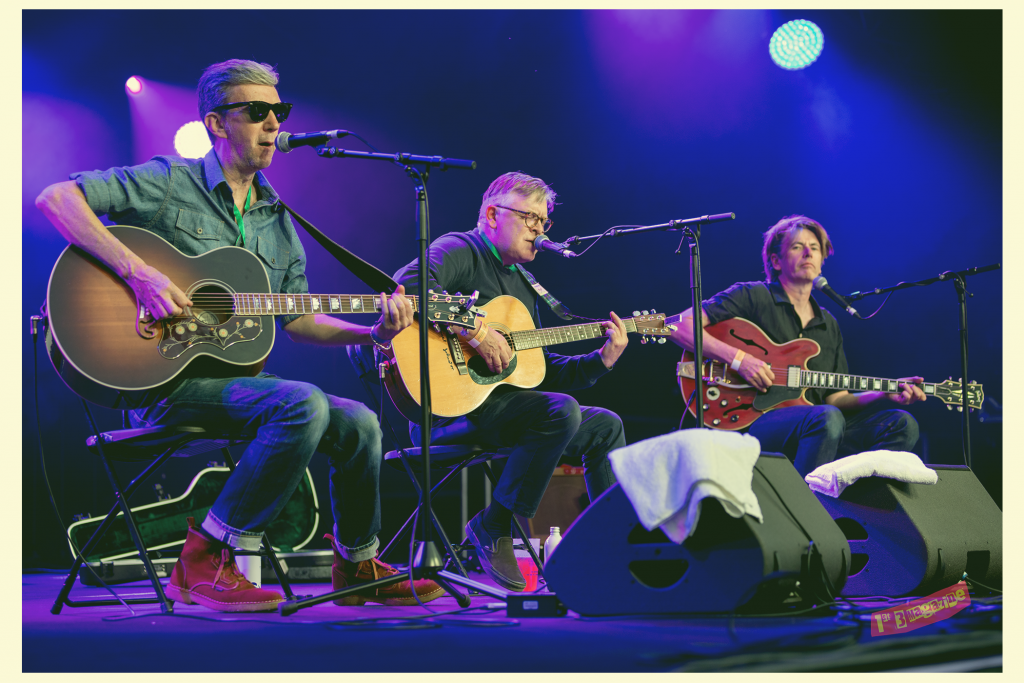
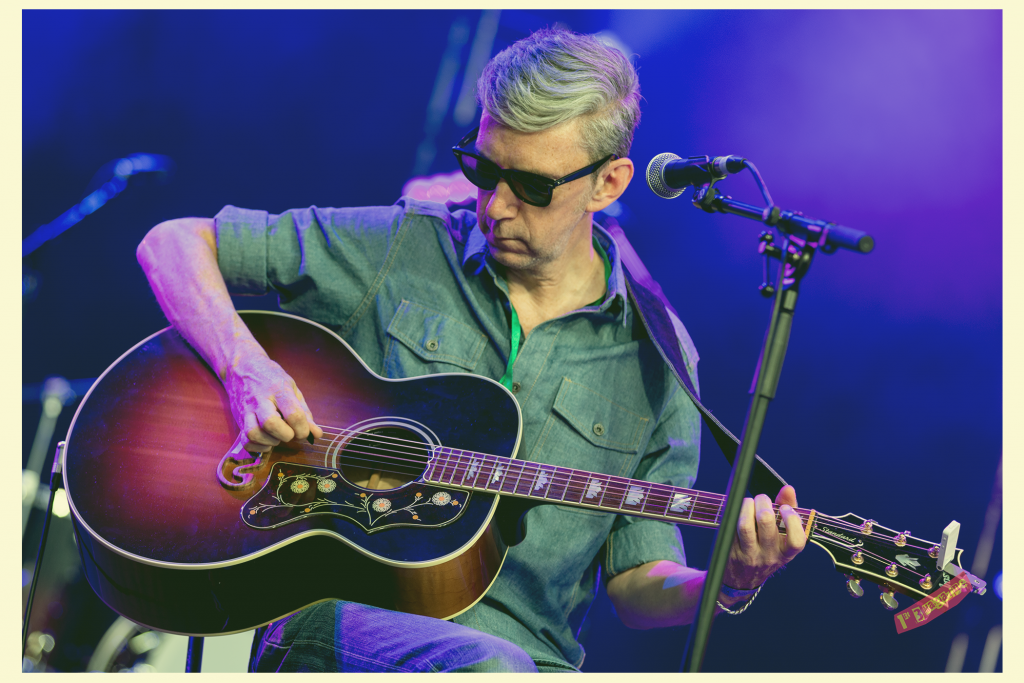
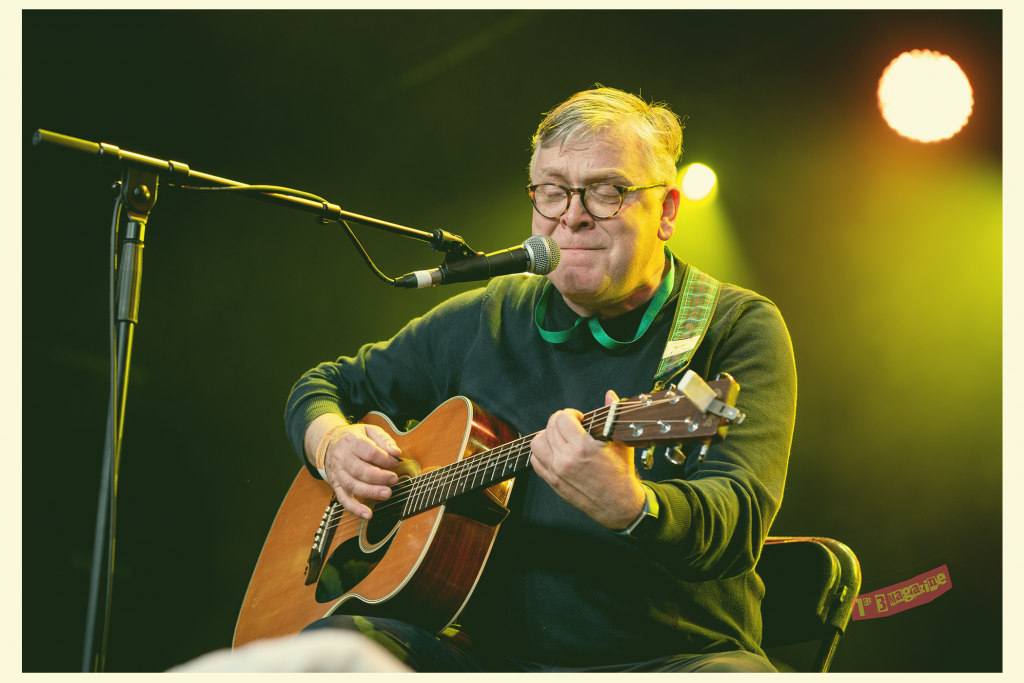
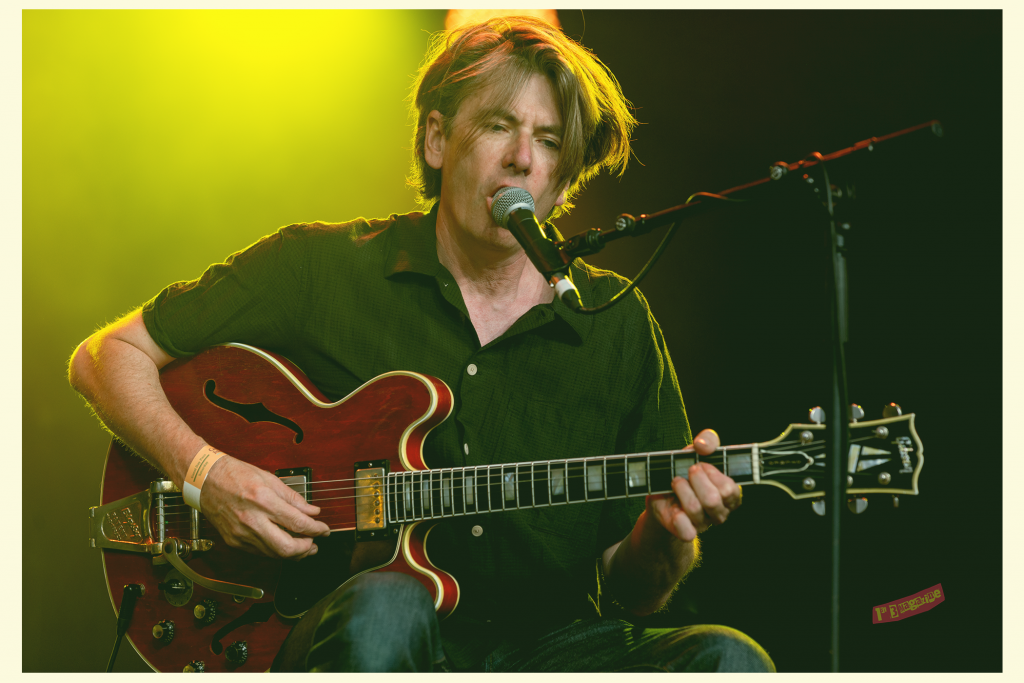
The indie folk crossover was well represented with 1990s Suede legend Bernard Butler joining Norman Blake formerly of Teenage Fanclub and James Grant from the less well-known Love and Money. It was fine as background picnic music and the cover of 1995’s Yes, from Butler’s collaboration with singer David McAlmont, was certainly uplifting, but this project wasn’t really utilising the talent of someone who wrote and played the guitar parts for classic numbers such as Animal Nitrate and So Young.
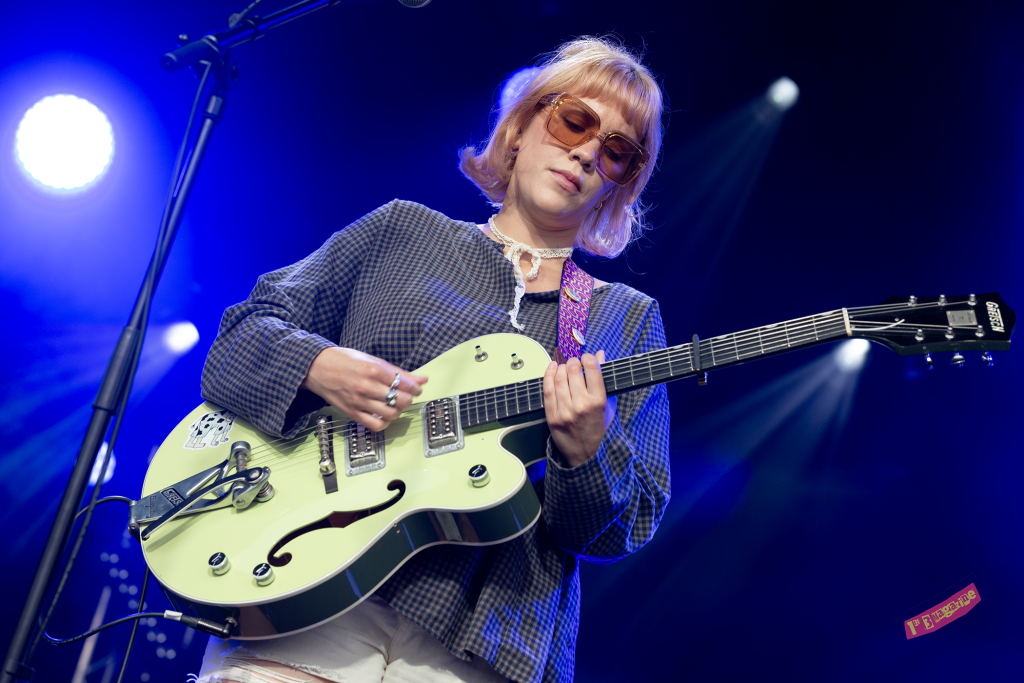
Other indie performers included Bess Atwell, with her sexy pistachio-green Gretsch, who delivered folk music with a touch of The Cardigans and The Sundays’ style of soft, sweeping, female-fronted pop.
(Darlingside) the perfect match for the Cambridge folk audience."
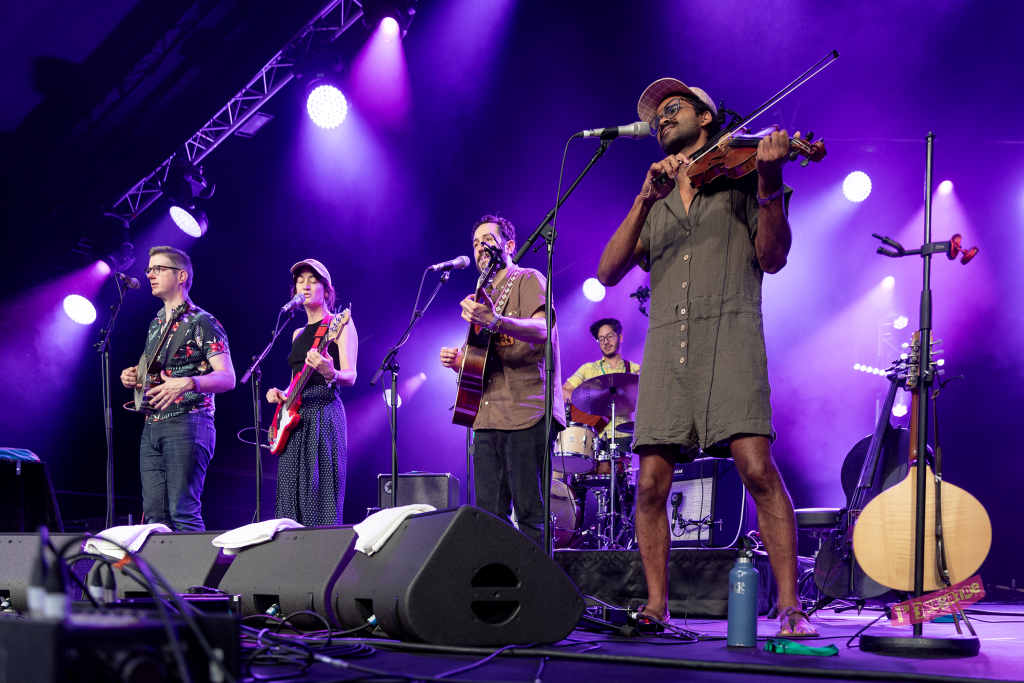
The truly lovely Darlingside have enchanted Cambridge before, and this year was no exception with their Simon and Garfunkel influenced tunes floating over the assembled crowd. No longer huddled across one microphone, they had separate ones this time, as well as a couple of new members, but their gentle songs of nature and love were the perfect match for the Cambridge folk audience.
we’re better than Coldplay.."
Turin Brakes
Saturday night gave us Turin Brakes and their college rock style romantic tunes with bite. In their words, one song ‘sounds a bit like Coldplay but we’re better than Coldplay’ and the crowd clearly agreed judging by the successful demands for an encore.
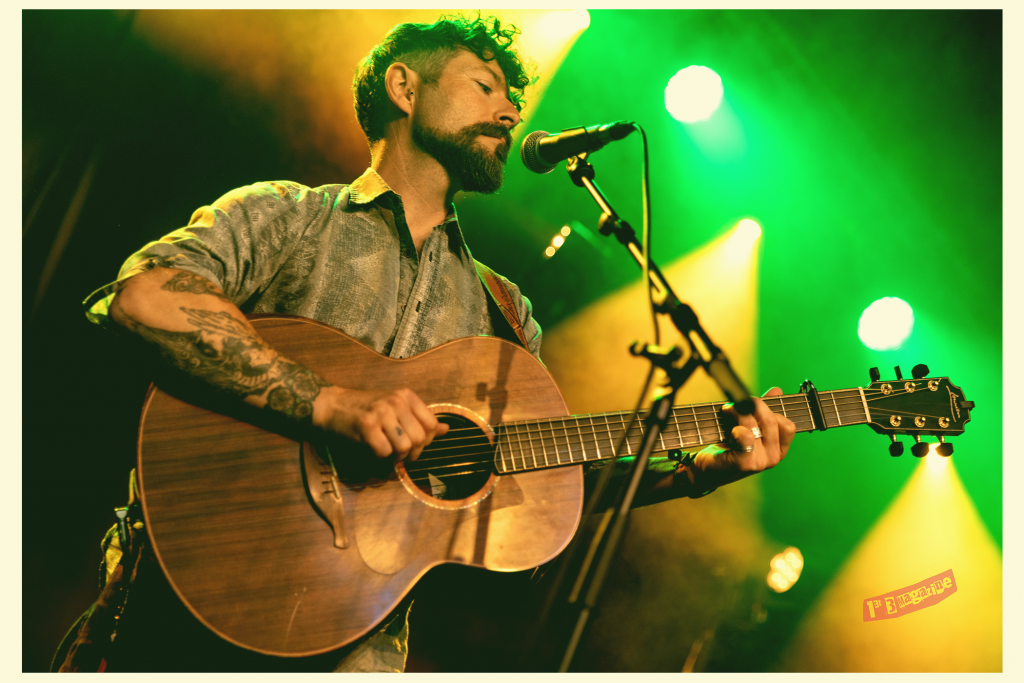
Niall McCabe’s previous band supported Ed Sheeran but don’t let that put you off. He provided both traditional Irish music and a wicked sense of humour. One song told of a pregnant women whose boyfriend told her to meet him in his boat so that they could run away together but he planned to drown her in the sea. ‘That’s not an option’ he cheekily advised young men in the audience faced with such a dilemma.
Altogether happier songs were penned by the similarly smiley Jon Muq, a singer-songwriter originally from Uganda and now based in Austin, Texas. His set included a love letter he wrote as a favour for a friend who wanted to woo a woman. It worked, so he reclaimed it as a song. With his debut album released on May 31st, produced by Dan Auerbach, and tours alongside artists like Billy Joel, Norah Jones, Mavis Staples, Amythyst Kiah, and Corinne Bailey Rae, Muq is broadening the reach of his music to connect with an ever-growing audience.
There were countless displays of extraordinary musicianship, but Tommy Emmanuel stood out, merging with his guitar as if it were an extension of his very being. His virtuosity was both technically astounding and so effortlessly executed that it left the Cambridge audience utterly mesmerized.
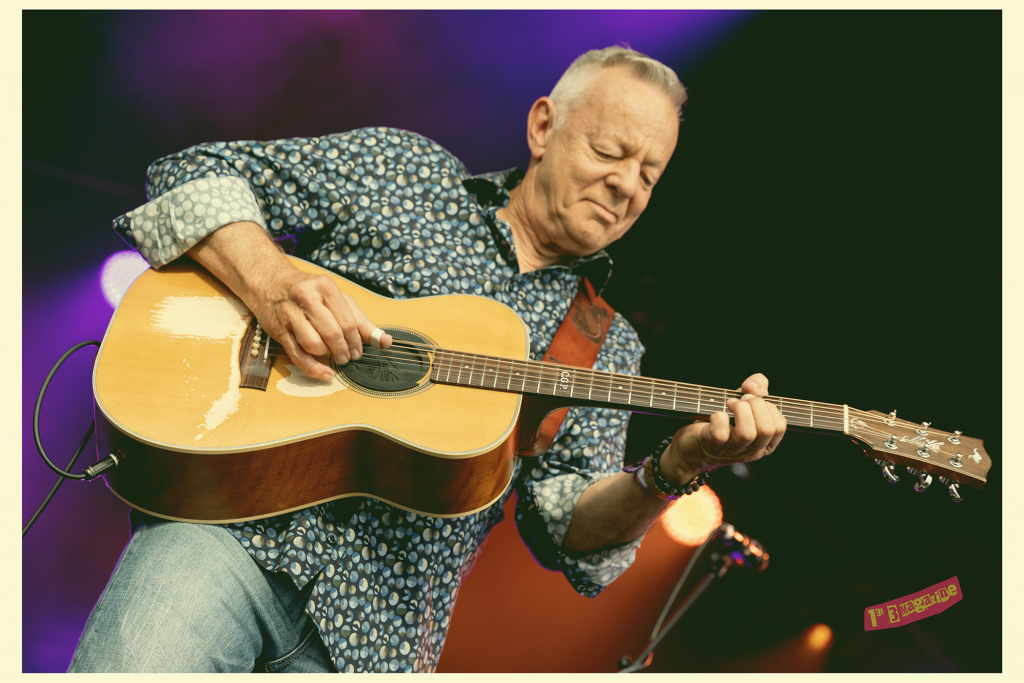
French Canadian veterans, Genticorum played their trademark upbeat Quebecian folk with the widest smiles on their faces. Equally amiable and wearing a lovely dress, Sarah Hagen demonstrated her outstanding keyboard skills, playing Gershwin influenced numbers. Jerry Douglas’s set on the dobro and lap steel guitar soared across the blue skies of Cambridge and pleased bluegrass lovers.
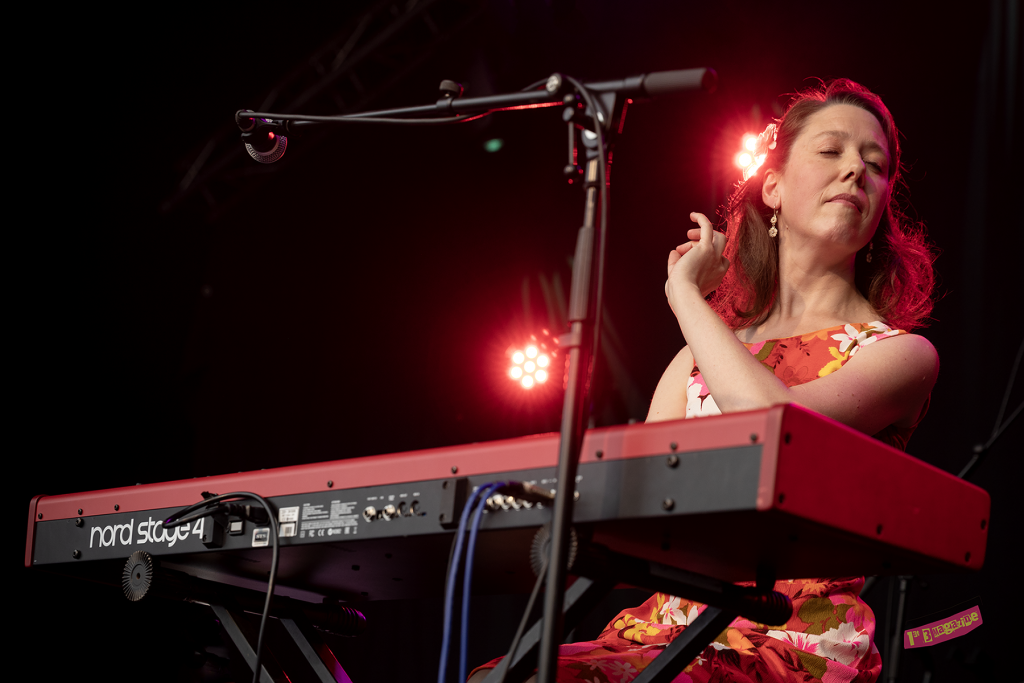
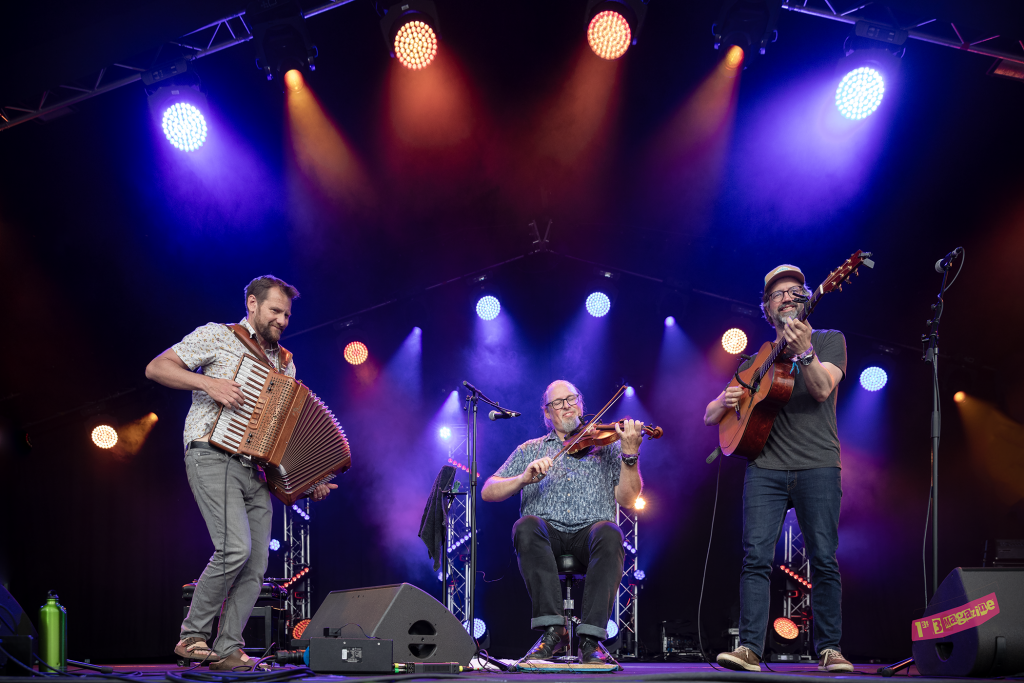

Playing to a far smaller audience than he deserved (he was up against Robert Plant on Stage 1), Taylor McCall showcased his mastery of blues guitar. Headlining the main stage on Friday night, the Scottish three-piece Talisk played traditional folk in a haze of sound and light at breakneck speed to an appreciative crowd. Fellow Scots Fara brought strong and exuberant female energy to fiddle playing. The older generation was also well represented, with folk festival stalwarts Oysterband, Capercaillie, and McGoldrick, McCusker, and Doyle showing that they still have what it takes to excite and move the crowd. Oysterband’s set was particularly poignant, as they are heading towards retirement, making it unlikely that they will grace the Cambridge stage again.
One of the two more flamboyant acts provided perhaps the most memorable moments of the weekend. Returning to Cambridge, the super-fly Fantastic Negrito was utterly resplendent in a gold outfit, complete with a long, cape-like coat—superhero meets ’70s pimp. This was so much more than mere showmanship; this was a man with authenticity and commitment. His voice had it all—soul, gravel, attitude, depth, range, and a sense of urgency.
The ghosts of James Brown, Prince, and Howlin’ Wolf were present on stage. This was blues, but not as you know it—power soul with a boosted, frenetic energy and a power all his own. He danced, roared, screamed, kicked, and shuffled across the stage with the charisma of an old-school preacher. We had been taken to church a ways back, but there were many souls here today newly converted.
Stay proud and radiate, only love can drive out hate"
Flamy Grant
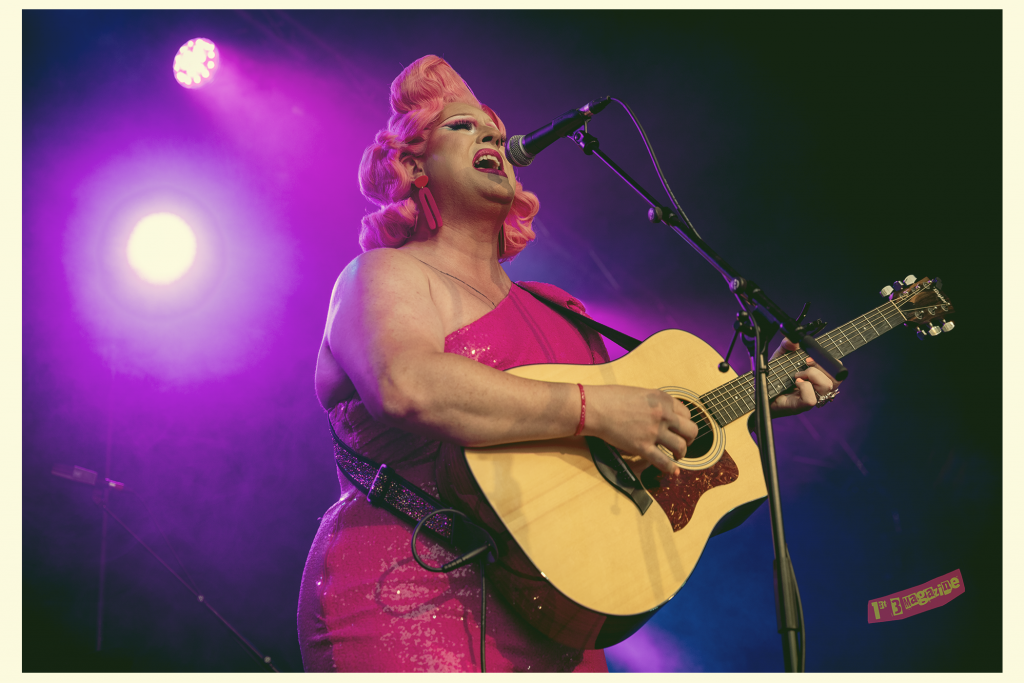
On the subject of taking it to church and back, fellow American Flamy Grant is an drag artist singing Christian country music. Sporting immaculately vintage styled candyfloss pink hair and rocking a sparkly pink suit and boots, and accompanied by a cellist, the catchy number S.P.R.K.L had the crowd singing along, ‘Stay proud and radiate, only love can drive out hate’, sentiments that the UK desperately needs right now.
Jeremy delivered a powerful performance, singing predominantly in his native language—a language spoken by only about 500 people today."
One of the standout performances of the CFF weekend came from First Nation Canadian artist Jeremy Dutcher. Seated at a stunning Steinway grand piano adorned with a Palestinian scarf, Jeremy delivered a powerful performance, singing predominantly in his native language—a language spoken by only about 500 people today.
His songs were enriched with excerpts from century-old recordings, discovered by his grandmother in a library. Many of these recordings, deeply connected to themes of water and rivers, resonated with a profound sense of nature and spirituality. Having been deeply moved by the history and resilience of First Nation peoples, this set was particularly poignant. After narrowly missing his show in London the week before, we were thrilled to witness his artistry firsthand. Jeremy, we will see you again.
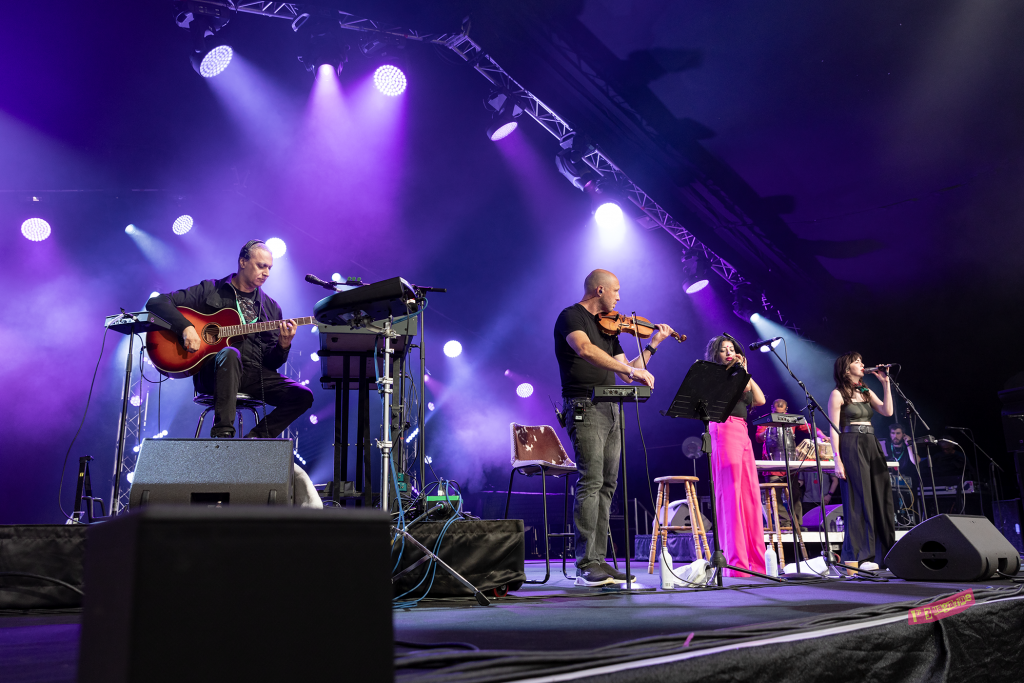
Other high emotion performances came from Dani Larkin, whose version of Morning Has Broken has a new intensity, and Nitin Sawney and band, who sang about identity and letting everyone ‘find their own happy’ rather than imposing one’s own views on them.
Sangjuro - they created a magical cacophony of sound."
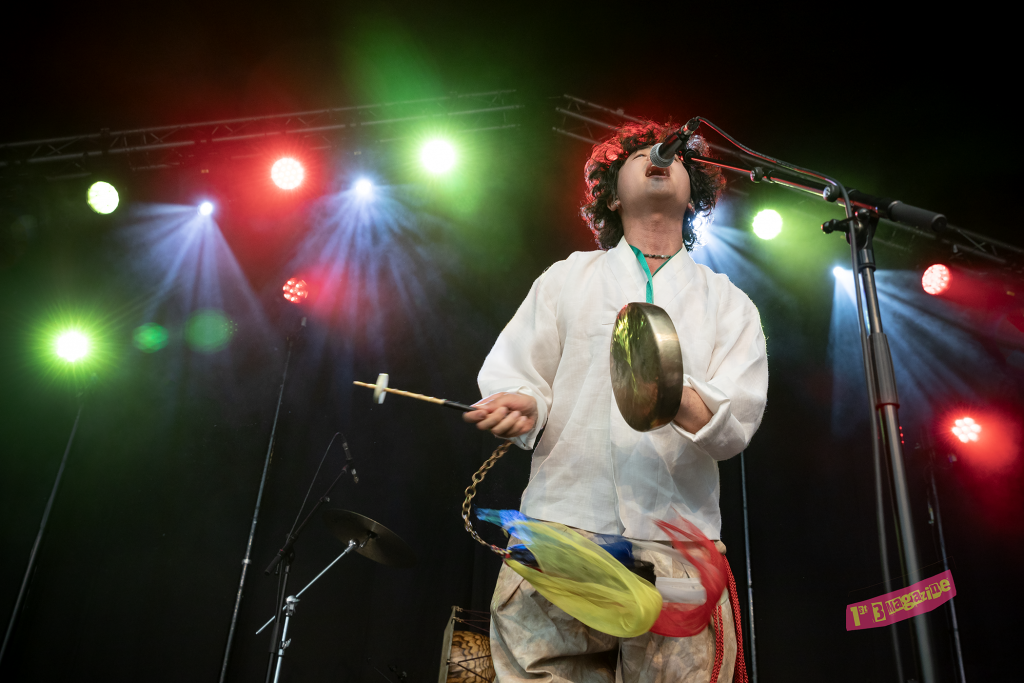
Aside from a whole bunch of North Americans, there seemed fewer international acts than in previous years, but there were some standout performances from those who did make the journey. Korean trio Sangjuro are a world away from K-pop boy bands. Playing a number of traditional instruments, they created a magical cacophony of sound.
With a flash of thigh, kaleidoscopic kimonos, and boots that could rival The Glitter Band."
With a flash of thigh, kaleidoscopic kimonos, and boots that could rival The Glitter Band, Sunday night brought us Mitsune on Stage 2—an act unlike anything else at this festival, or indeed most festivals. Hailing from various countries but settled in Berlin, these musicians of Japanese heritage play traditional Japanese folk with an avant-garde twist. Like the matcha bubble tea on sale at a nearby food stall, their performance must be experienced to be truly understood.
Cambridge provides a sense of stability in this unstable world—many of the stalls selling food, musical instruments, clothes, and other trinkets can be found in the same spot year after year. It’s comforting, you know? The twig sculpture of the violinist fox returns for photo opportunities, the day begins with t’ai chi and drawing workshops by the calm of the duck pond, and the ale and cider flow freely, now in reusable containers. That morning ritual at Cambridge is cathartic, bringing about a release of tension and emotion that has built up over the past month or year. There’s a sense of ‘letting go,’ a feeling of peace and well-being.
The festival attracts multi-generational families, with the old-timers pitching their camping chairs in the field outside the main stage while the children enjoy dancing and face painting. The middle demographic is somewhat less well represented, but acts like Larkin Poe help bridge the gap. Additionally, the smaller stages and workshops provide space for younger folk artists to gain experience and confidence, with Amy Iris and Lemoncello deserving special mentions.
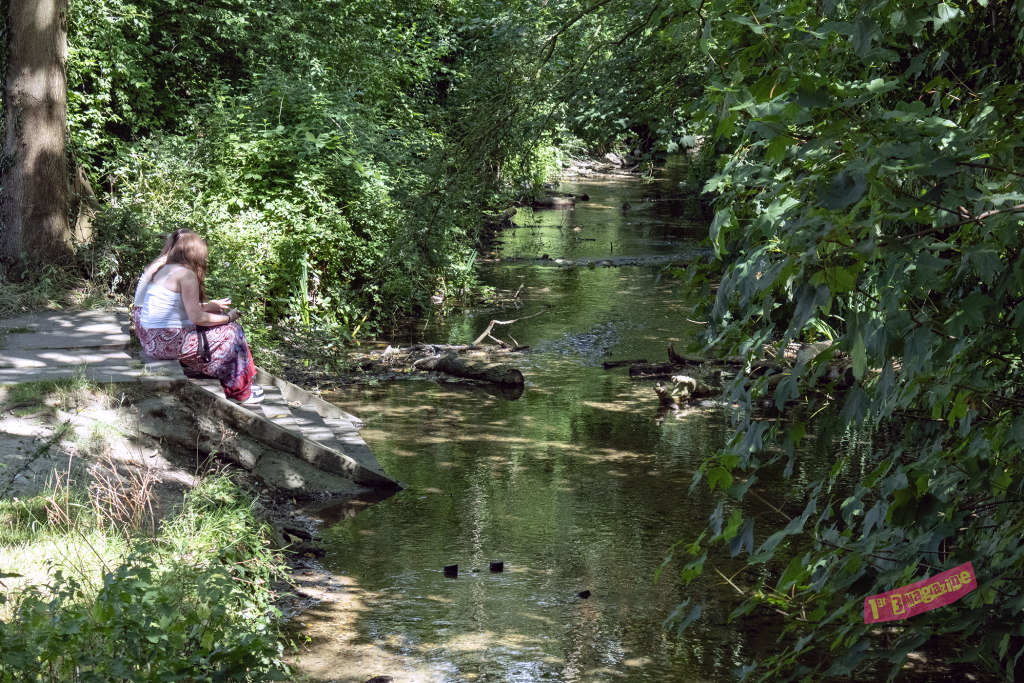
Although one might wish that more contemporary folk artists addressed issues such as the injustices of colonialism, Grenfell Tower, racialized stop and search, recent riots, homelessness, and food poverty in our current times rather than focusing on nineteenth-century concerns, this year’s festival was still brimming with passion, with numerous mentions of Palestine. Perhaps most notably, drag artists made a bold statement at Cambridge 2024, stamping their size 10 stilettos all over the event—and that can be no bad thing.
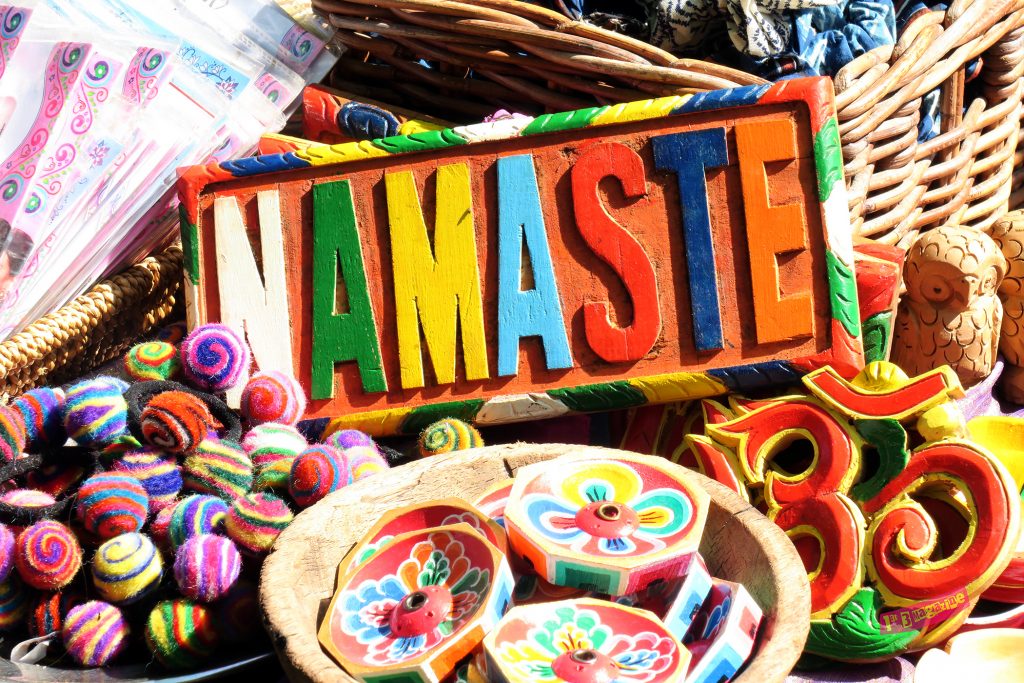
We would like to thank all the people involved in the fabulous organisation of CFF, all of our fellow media friends and all the other beautiful people we meet along the way.
Keep an eye out for individual artist reviews, interviews, and photo sets… until we see you again.

